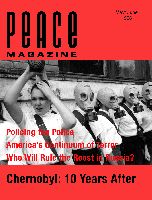
Peace Magazine May-June 1996, page 19. Some rights reserved.
Search for other articles by Johan Galtung here
Search for other articles by Peter Atteslander here
The year 1995 was widely celebrated as the fiftieth anni-versary of the end of World War II and of the founding of the United Nations. But it was also an anniversary of perhaps even greater significance: 900 years since Pope Urban II made a call for what became known as the first Crusade, in the French town of Clermont on November 27, 1095. Nearly two centuries later, the Crusades came to an end. But there has never been a real declaration of peace. The Crusades stand out in history as an example of how religion is used to justify war. Even today collective memories and a crusade mentality persist. Our task is to overcome that mentality.
On November 26-27, 1995, we convened a dialogue at the Swiss Academy of Development in Biel, with the assistance of its president, Fridolin Kissling. It brought together leaders of the Christian and Islamic faiths: Nuntius Archbishop K. J. Rauber, Bern; Metropolitan Parmaskinos, Geneva; Grand Mufti of Syria Farouk Akbi, Damascus; Ayatollah Mohammad Jafari, Tehran; and two dozen scholars and clerics.
Pope John Paul II sent his blessings and a message through Cardinal Angelo Sodano, Secretary of State of the Holy See: "...It is opportune to reflect on these events, in order to draw vital lessons for today. His Holiness renews the call of the Second Vatican Council which urged that a sincere effort be made to achieve mutual understanding, so that, for the benefit of all, Christians and Muslims would together preserve and promote peace, liberty, social justice and moral values..."
The participants agreed on a wide-ranging peace declaration. The Christian partners asked their Muslim, Eastern Christian, and Jewish sisters and brothers forgiveness for the destruction, bloodshed, and atrocities inflicted on them during the Crusades. The two largest abrahamic religions have a shared history of war, but also peaceful engagement and mutual enrichment. Historians should pursue research on Christian-Muslim relations, highlighting bright points rather than shadows, and bringing such perspectives into our education system rather than the voices of hatred and revenge. The participants expressed sorrow and compassion for the victims of misguided rhetoric and violence, and added their voices to the many who urge a new beginning in Christian-Muslim relations.
They called for 100,000 dialogues to blossom between Christians, Muslims, and others, at all levels, in all fields, about what they fear in each other, what attracts them, and about solutions to common problems. Given the shallow, mainly negative knowledge of each other, they appealed for courage to face points of disagreement and to discuss their mutual fears.
They asked religious leaders to avoid and denounce the use of violence and war in the name of religion. They emphasized the Biblical and Qur'anic bases for dialogue and nonviolence. Christians should not portray Muslims and Islam as the new threat or speculate on a "clash of civilizations," lest it become a self-fulfilling prophecy. Muslims should avoid portraying Christians as the ongoing enemy, and as a "crusading" civilization.
Political oppression was denounced. Christians and Muslims are not only geographical neighbors; their lives today are intertwined, like their histories, as minorities in each others' lands. Religious minorities must be fully accepted and not be treated as "second class citizens."
The participants denounced inequality based on religious identity and economic exploitation of all kinds. Trade between regions of different religions has to become equitable to serve as a basis for peaceful coexistence.
The adherents of Islam and Christianity proposed the following:
We need to go beyond mere tolerance and open our hearts and minds to each other. Instead of sensing danger when somebody is different we should enjoy the opportunity to learn, to enrich and be enriched, to live in peace and create peace. Like everything else, the two largest religions in the world are also subject to development. While keeping their basic message of devotion, let us find new ways, acts, and words. Genuine respect for other religions evolves from the spirit of freedom of interpreting one's own religion. Let the next 900 years and beyond be an era of active peace built in our hearts and our minds, and enacted in our deeds.

Peace Magazine May-June 1996, page 19. Some rights reserved.
Search for other articles by Johan Galtung here
Search for other articles by Peter Atteslander here